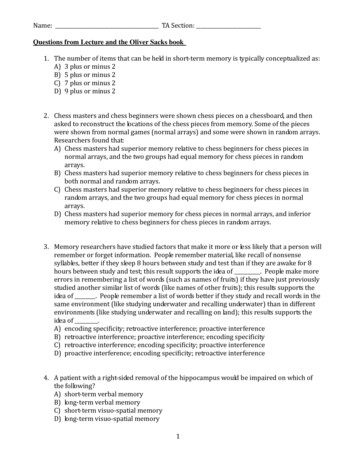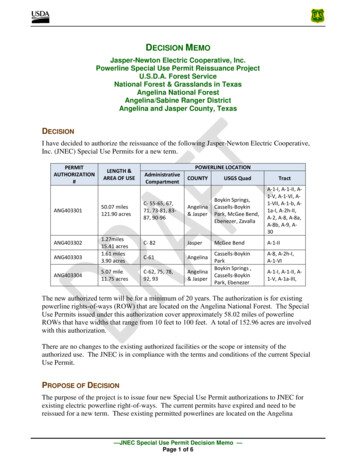
Transcription
Polling Memo and Summary for Florida Release2015 Environmental Attitudes SurveySubmitted toEarthjustice and GreenLatinosGary M. SeguraPrincipal and Co-Founder andProfessor of Political Science, Stanford UniversityAdrian PantojaPollster and Senior Analyst andProfessor of Politics, Pitzer CollegeSeptember 1, 2015
Polling Memo and Summary for California Release2015 Environmental Attitudes SurveyLatino Decisions in partnership with Earthjustice and GreenLatinos conducted a nationalsurvey of Latino registered voters and their attitudes toward the environment. The survey,fielded between June 24 and July 8, is based on a national sample of 1,200 Latino registeredvoters who were interviewed by landline, cell and on-line in English and Spanish. As partof that effort, California and Florida were oversampled, with 300 interviews completed ineach of those states. The state samples carry a nominal margin of error of /-5.7percentage points.Here we examine results from Florida. The national results find that Latinos care deeplyabout the environment and specifically about its impact on their families. We found thatLatinos are as engaged, if not more so, in issues of climate and environment, that they havestrong personal interests in seeing the environment improved, and that these issues matterin their political calculi. Here, we take an in-depth look at the Florida results. Florida ishome to over 4 million Latinos, which constitutes one-quarter of the state’s totalpopulation. Historically, Cuban Americans have wielding significant influence in Floridapolitics, specifically in the counties of Miami-Dade and Broward. However, the compositionof the Latino electorate in Florida is changing. Of the 1.5 million eligible Latino voters in thestate 36% are Cuban, 32% are Puerto Rican and 21% are Central/South American. Thus, itwould be a mistake to equate the Latino electorate in Florida as exclusively composed ofCuban Americans.When highlighting important claims in your external communications, we believe the pollbest illustrates the following themes:1. Cuban Americans have historically aligned themselves with the Republican Partyand tend to take conservative positions on a number of domestic and internationalissues. Although the size of their electorate is shrinking relative to other Latinogroups in the state, their views create distinct patterns when surveying Latinosstatewide. Nonetheless, the key take-away from our survey is that Florida’s Latinopopulation is more alike than different from Latinos in other states when it comes toenvironmental attitudes. There are of course, notable differences, which we willhighlight. For example, in the battery of questions related to environmental and1
non-environmental policy priorities, “promoting economic growth” (91% saying itwas an important issue) and “combating terrorism and ISIS” (87% saying it was animportant issue) were ranked highest. Nonetheless, environmental issues alsofigured in prominently among Latinos in Florida. Of the top five highest rankedissues (by report of importance of issue), three of them were related to theenvironment. The top three environmental issues for Latinos in Florida werestrengthening the Clean Water Act (84%), increasing water conservation (82%) anddeveloping clean energy sources (81%).2. Nearly three quarters (74%) of Latinos in Florida are worried (somewhat to very)about climate change and they, more than other Americans, see climate change as aconsequence of human activity. Two-thirds (66%) accept anthropogenicexplanations of global warming. Comparing our results to other national surveys ofthe broader population, the differences are around 14 percentage points. Althoughthese two figures are slightly lower than those found among Latinos in California,the fact that the differences are within the margin-of-error suggests that Latinos inthe Golden State and Sunshine State are more alike than different.3. Latino concerns are transnational. Over two-thirds (65%) of Latinos are aware ofenvironmental degradation and climate impact in their countries of origin andconsider this when developing their views.4. Access to clean water and air seem to be less pressing for Latinos in Florida. In thesurvey we asked respondents to assess whether contaminated water and airpollution in the city were serious threats to the health of their families. Althoughthere was concern about contaminated water (60% said it was a somewhat to veryserious health issue); Latinos in California displayed higher levels of concern (80%said it was a somewhat to very serious health issue). The results from Californiaemphasized how air pollution was a major environmental issue for Latinos in thestate. In Florida air pollution was not regarded as a serious health threat, with 49%saying it was a serious (somewhat/very) health issue. In California, 77% said it wasa serious health issue.5. Latinos in Florida do not accept the jobs/environment trade-off and believe greenenergy and environmental reform is either good for economic opportunity and jobgrowth (55%) or has no effect (22%). Only 12% accepted the jobs/environmenttradeoff. (Nationally, 59% thought environmental reform was good for theeconomy.)2
6. Latinos want to reward candidates and office-holders who address environmentalproblems. Respondents reported feeling more favorably (by 71%) about officialswho act on behalf of the environment. This finding is politically significant given thatLatino politics in Florida is synonymous with the Republican Party. The resultsshow that Latinos are supportive of candidates that take a progressive position onthe environment. This finding should be highlighted to both Democratic andRepublican candidates and elected officials.7. Outreach to Floridians by environmental organizations is modest and consistentwith national numbers. Nationwide, 76% had never been contacted by a greenorganization, 74% had never taken any action like signing a petition or attending ameeting or rally, and 87% had never been an actual member of a green organization.By comparison, in Florida, 81%, 76%, and 93% respectively, meaning no significantvariation between the national experience and Florida experience.Below are Florida-specific take-aways for the press, elected officials, and the public: The recommendations outlined in the analysis of the national survey apply toLatinos in Florida with some important differences. In a battery of thirteen separate questions related to environmental and nonenvironmental policies issues; there is a slight reordering in the rankings of issuepriorities. For Latinos in Florida, three of the top five ranked issues areenvironmental. These include strengthening the Clean Water Act, increasing waterconservation and developing clean energy sources. Latinos in Florida do not accept the jobs/environment trade-off, but by a lowermargin than Latinos in California. The gap may be due to the fact that California hastaken more progressive positions on the environment, is a leader in developing andimplementing cleaner energy sources, or that that its political leadership hasembraced conservationist policies. Although Florida’s Latino population and electorate are smaller than California’s,Latino voters are politically significant in national elections given that Florida isconsidered a swing state. This enhances the political capital of Latinos in the state.The fact that Latinos in Florida have pro-environmental attitudes should not be loston Democratic or Republican candidates.3
Gary M. Segura, Co-Founder and PrincipalDr. Gary Segura is a co-founder and Principal at Latino Decisions. He is also Professor ofPolitical Science at Stanford University, and Co-Principal Investigator of the AmericanNational Election Studies (ANES). He received his Ph.D. from the University of Illinois. Overthe last 18 years, Segura has directed polling research that has completed over 100,000interviews with Americans of all backgrounds on matters of social and political importance.He has briefed members of
Studies and Chicano Studies at Pitzer College, a member of the Claremont Colleges. He received his B.A. from the University of San Francisco and Ph.D. in Political Science from the Claremont Graduate University. At Latino decisions, Pantoja has directed all major research on Latino environmental











